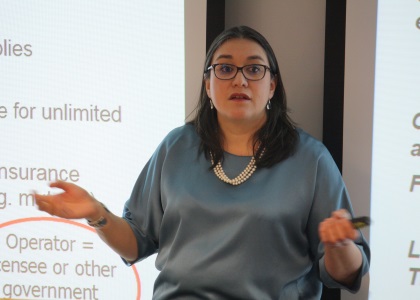Information
Venue
Start
End
Nuclear Liability in practice – The TEPCO Fukushima Daiichi NPP accident
Synopsis

The TEPCO Fukushima Daiichi nuclear power plant accident made evident the importance for countries to be prepared to deal with the legal implications of a nuclear accident. The accident did not cause bodily injury or casualties due to the release of radioactive substances within the population living around the nuclear power plant, but it affected the lives of tens of thousands of displaced citizens, resulted in very large economic loses and caused considerable environmental damage. It also fully demonstrated that a clear and comprehensive legal framework is necessary to allow the operator of a nuclear installation and, if necessary, its government, to quickly react and adapt to the specific circumstances of events in order to ensure timely and financially adequate compensation to victims.
Since the beginning of the nuclear industry, special regimes governing liability for nuclear damage suffered by third parties have been put in place, both at the international level through international conventions, and at the national level through domestic legislations. These regimes have been largely adhered to by nuclear power generating countries, especially at the national level, but they have also been adopted by many non-nuclear power generating nations. Countries that follow the regimes wish to ensure timely and adequate compensation of victims of nuclear accidents. These countries take the position that ordinary tort law is not well suited to deal with exceptional risks related to nuclear installations and have opted for regimes that are founded upon a series of specific basic principles.
Although Japan was not a party to any of the international nuclear liability conventions at the time of the accident, its national legislation conforms to their basic principles. The existing Japanese legislation on nuclear third party liability, coupled with the innovative mechanisms adopted to supplement that legislation, fulfilled the purpose of allowing the nuclear operator, TEPCO, to compensate victims of the accident in a timely and adequate manner given the circumstances.
Presentation
Download Ms Vásquez-Maignan’s presentation in PDF format.
About the Speaker
Ximena Vásquez-Maignan is the Head of the Office of Legal Counsel of the Nuclear Energy Agency (NEA) of the Organisation for Economic Co-operation and Development (OECD). Previously, Mrs. Vásquez-Maignan was the Senior Legal Adviser for the Legal Affairs Section of the NEA from June 2011 until she was appointed Head in March 2015.
Mrs. Vásquez-Maignan works extensively on nuclear law, providing legal opinions and secretariat services to the NEA Nuclear Law Committee and the Contracting Parties to the Paris Convention on Third Party Liability in the Field of Nuclear Energy and the Brussels Convention Supplementary to the Paris Convention.
Before joining the NEA, Mrs. Vásquez-Maignan worked for six years as an international legal adviser for a leading global water company and then settled down in China for eight years where she acted at first as a senior legal adviser for a French nuclear power company and then as a senior associate for an international law firm where she advised on nuclear issues. These different positions, where she advised investors, operators, service and equipment suppliers, have allowed her to acquire a wide perspective of the nuclear sector.
She is co-Chair of the working group on Nuclear Liability and Insurance of the International Nuclear Law Association. She has also participated in educational programmes in nuclear law, international working groups on nuclear liability and has made presentations at international seminars and conferences.
Mrs. Vásquez-Maignan, a Chilean and French national, studied law at the Université de Paris II-Assas (Paris, France) and is a French qualified lawyer registered with the Paris Bar. She speaks English, French and Spanish.
Event e-Flyer
